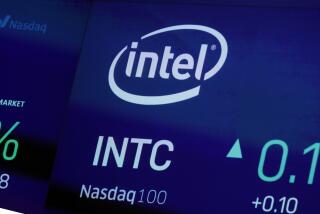What the Rise of Information Appliances May Be Telling You
- Share via
When Web-linked information appliances abound, will the “Wintel” stocks fade?
In the heyday of the mainframe computer, IBM was the only tech company that mattered.
But with the rise of the personal computer, the baton--and vast revenue streams--passed to the so-called Wintel duo of Microsoft (with its Windows PC operating system) and Intel (with its microprocessor brains for PCs, now led by the Pentium line).
That sea change almost sank IBM in the early 1990s before it regrouped.
This year may come to be known for another sea change, as new Internet-access devices begin to challenge the PC.
The gadgets, often grouped together as “information appliances,” range from 3Com’s Palm hand-held organizer to Web-enabled cell phones, cable set-top boxes and products that are more like consumer electronics than computers.
If tech stocks are supposed to reflect where companies are going rather than where they’ve been, it’s worth asking if the $600-billion-plus combined valuation now assigned to Microsoft (ticker symbol: MSFT) and Intel (INTC) adequately reflects the risks of a future in which many of us get our Net through devices that don’t do Windows and don’t have Intel inside.
Microsoft accounts for two-thirds of the Wintel valuation. It’s more diversified than Intel, more insulated from the raging PC price war and has next to no manufacturing overhead.
But new information appliances pose threats to both companies.
It’s already clear that the allies aren’t calling the shots here. They’re being forced to compete for contracts--pitching their products in a fragmented market that has room for many operating systems and many microprocessors.
Eventually, the devices could siphon off PC revenue as consumers prefer their user-friendliness and specialized functions. In the bigger picture, appliances quicken the shift in key standards from the lucrative Windows-Pentium platform to the Internet itself, which is owned by no one.
“The Internet is becoming the uber-platform,” said analyst Mark Specker of SoundView Technology Group. “There is no question that it will have a profound impact on current platform suppliers like Intel and Microsoft. . . . They will have to live with what they can’t control.”
Microsoft’s agenda for extending its franchise to appliances revolves around its scaled-down operating system, Windows CE. That software now runs an estimated 25% of hand-held devices worldwide, versus 43% for 3Com’s Palm OS. Britain’s Psion and Japan’s Sharp divide most of the rest.
In fact, the software titan is investing in gizmos across the board. It put Windows CE in the Clarion AutoPC, a voice-based system that receives wireless e-mail on the road. Upcoming Internet-linked cell phones from Matsushita will use CE, but Nokia, Ericsson and Motorola went with Psion.
On Monday, Microsoft made another thrust, saying it will invest $600 million in nationwide wireless phone company Nextel Communications.
Microsoft’s WebTV line, meanwhile, is far from a home run, but the software titan’s deal to install CE in cable boxes for cable giant TCI, now owned by AT&T;, got a boost last week when Microsoft agreed to invest $5 billion in AT&T; as part of AT&T;’s deal to buy cable operator MediaOne Group.
The cable-box deal is nonexclusive, though, and Sun Microsystems, Sony and Network Computer also sell interactive-TV software.
Although Intel’s primary chip for hand-held devices, the StrongARM, is widely admired, Palm runs on a Motorola chip. Mips Technologies is entrenched in this niche, and National Semiconductor plans to flee the crushing PC market and concentrate on appliances.
Intel, meanwhile, has hinted at deals for set-top box chips but hasn’t named its customers.
Appliances will be linked to servers, which have developed into a rich market for Wintel. Systems powered by Intel’s Xeon chip running Microsoft’s Windows NT are flying out the door. Yet they will never approach the volume of the desktop PC business.
And even here, Wintel is a challenger. The Unix operating system, sold with servers from Sun, IBM, Hewlett-Packard and others, is holding its own, especially in larger networks too demanding for NT.
Nevertheless, Intel and Microsoft will pile up profits in this market. In the short term, says SoundView’s Specker, the Microsoft story will only get better as the next release of NT, dubbed Windows 2000, roars into the market.
As for Intel, bullish analysts such as Stephen Dube of Wasserstein Perella and Ashok Kumar of Piper Jaffray point to Xeon’s momentum and the upcoming Merced chip, which will power not only Windows NT servers but also Unix machines with no connection to Microsoft.
What of the bread-and-butter PC business? The debate about whether appliances will complement it or kill it is just beginning. Meanwhile, the PC industry forecasts 13% to 15% unit sales growth this year, with meager if any revenue growth (as prices fall).
Longer term, the info appliance threat is real, but not many investors will unload the Wintel stocks before the threat comes into clearer focus, says Nick Moore, analyst with Jurika & Voyles. “I see their susceptibility to these devices, but so far, no one has shipped anything that makes sense as an alternative to PCs.”
Nevertheless, he added, “Microsoft’s valuation is gaga, and doesn’t reflect any of these risks.”
That’s the problem. Info appliances highlight trends that Microsoft can only cope with rather than control: the price slide in Windows-based hardware; the growth of markets that are hostile to a Windows monopoly; the importance of Internet services, where Microsoft has had mixed results at best. A lot of faith is built into its stock price-to-earnings ratio of about 60.
“For investors, there’s certainly more risk in the future,” said Specker. “Microsoft’s Windows monopoly will fade. But Microsoft’s real strategy is evolutionary. They realize they have to change to survive.”
Intel is also trying to morph its way to growth while it strives to pare costs as fast as prices for its chips decline.
The company also continues to “seed” software firms it hopes will spur demand for Intel silicon, as Chairman Andy Grove explains in a story in the Times’ Investment Strategies special publication today.
In addition, Intel has acquired ICat, an e-commerce firm; Shiva, a computer networker; and Level One, a network chip maker; and it plans to offer new services managing data in so-called server farms.
Analyst Drew Peck of Cowen & Co. believes Intel has no choice but to launch such precarious ventures outside its core expertise.
“It has been restructuring to adapt to the post-PC era because the growth in the chip business will come from the networks and information appliances,” Peck said. “The technology that made the PC possible is finally migrating into every aspect of our lives--it’s a very exciting time, but not necessarily for Intel. The stock’s valuation, I think, is strangely high, given the uncertainty that surrounds Intel’s business in the next couple of years.”
Longtime Wintel watcher Rob Enderle of Giga Information Group expects these trends to catch up with the shares. And maybe it’s already beginning: Microsoft stock is down 17% from its recent peak; Intel is down 16%.
By early next year, Enderle says, Internet service providers such as America Online will assert control over info appliances, reducing them to low-cost vehicles for their services.
“ISPs will be giving away equipment free and they will dictate what will be built, so control moves away from Microsoft and Intel,” said Enderle. “When the blueprint for subscription-based services hits, the market will see that there’s a lot of new risk in these companies.”
*
Times staff writer Edward Silver can be reached at edward.silver@latimes.com
* TECH’S NEXT WAVE: A look at info appliances’ potential winners and a Q&A; with Intel’s Andy Grove, in today’s Investment Strategies section.
(BEGIN TEXT OF INFOBOX / INFOGRAPHIC)
‘Wintel’ Rules the Tech Roost -- at Least for Now
The $600-billion combined market value of Microsoft and Intel dwarfs the values of other major technology companies. It’s a measure of the hold that the “Wintel” system--Microsoft’s Windows software and Intel’s microprocessors--has on the personal computer market.
Market Value
in billions of dollars:
Microsoft: $402
Intel: $201
IBM: $201
Cisco Systems: $174
America Online: $139
Dell: $107
Hewlett-Packard: $82
Motorola: $49
Sun Microsystems: $46
Compaq: $45
Texas Instruments: $41
Oracle: $35
3Com: $10
How the Stocks Stack Up
Financial details on Microsoft and Intel shares:
Stock 52-week high
Microsoft: $95.63
Intel: $71.81
*
Monday close
Microsoft: $79.69
Intel: $60.63
*
Decline from high
Microsoft: -17%
Intel: -16%
*
Estimated 1999 earnings per share
Microsoft: $1.34*
Intel: $2.32
*
Estimated 2000 earnings per share
Microsoft: $1.55*
Intel: $2.70
*
Estimated earnings growth, 1999 to 2000
Microsoft: 16%
Intel: 16%
*
Stock price-to-earnings ratio on 1999 estimate
Microsoft: 59
Intel: 26
* Microsoft’s fiscal year ends June 30.
Earnings-per-share estimates are analysts’ consensus estimates.
Sources: Bloomberg News, Times research, Zacks Investment Research






